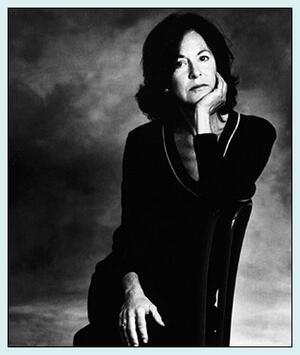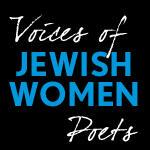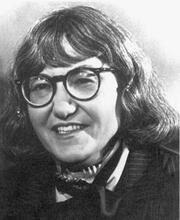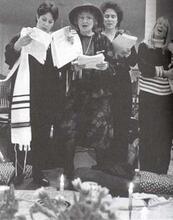Louise Glück
Louise Glück, poet, essayist, and educator, was born on April 22, 1943, in New York City. Glück, the recipient of the 2020 Nobel Prize in Literature, also received numerous other awards for her contributions to poetry and served as poet laureate of the United States from 2003 to 2004. One finds the personal, the mythological, and the Biblical woven intricately throughout Glück’s oeuvre. Her poetry is informed by a variety of sources, such as Greek mythology, fairy tales, and the Hebrew Bible and New Testament. Major themes in Glück’s writing include motherhood, family conflict, marriage, separation, intimacy, the body, death, grief, and nature. Although Glück described Jewishness as not central to her childhood, allusions to Jewish themes, figures, and texts populate her poems.
Poet and Critic
Louise Glück, poet, essayist, and educator, was born on April 22, 1943, in New York City and raised in Long Island. In “Education of the Poet,” an autobiographical essay in Proofs and Theories: Essays on Poetry, Glück writes of being compelled, throughout much of her life, to seek out the most accurate language with which to depict life experiences. Glück writes, “I had, early on, a very strong sense that there was no point to speech if speech does not precisely articulate perception” (5). This belief in precision with language and form is evident in Glück’s oeuvre of poetry collections, among them Firstborn (1968), The House on Marshland (1975), Descending Figure (1980), The Triumph of Achilles (1985), The Wild Iris (1992), and Ararat (1990). Faithful and Virtuous Night (2014) is Glück’s newest collection of poetry to date.
In addition to poetry, Glück published two major volumes of poetic criticism, Proofs and Theories: Essays on Poetry (1994) and American Originality: Essays on Poetry (2017). For her poetry and scholarship, Glück received numerous prestigious awards and distinctions, such as a National Book Critics Circle Award for The Triumph of Achilles, a Pulitzer Prize for The Wild Iris, and a National Book Award for Faithful and Virtuous Night. Other recognition for Glück’s contribution to American letters includes a National Endowment for the Arts Fellowship, a Guggenheim Fellowship, an American Academy of Arts and Letters Gold Medal in Poetry, and a National Humanities Medal. From 2003 to 2004, Glück served as poet laureate of the United States, and in 2020, she was awarded the Nobel Prize in Literature.
Poetic Style
Taken together, Glück’s poetry collections intricately weave the autobiographical, the confessional, the mythological, and the Biblical. Some of the major themes explored by Glück are motherhood, family conflict, marriage, separation, intimacy, the body, death, grief, and nature. Glück draws on multiple textual traditions throughout her work, in particular Greek mythology, fairy tales, and stories from the Hebrew Bible and the New Testament. Other influences Glück names are Shakespeare, Blake, Yeats, and Eliot, the poets she read in childhood (“Education,” 7). These influences are manifest in Glück’s lyric poems, with an economy of language and often sharp lineation.
One signature feature of Glück’s poetry is giving voice to historical or literary figures, known as persona poems. The personas are as varying as Joan of Arc, Orpheus and Eurydice, Penelope, and Abishag from the Hebrew Bible. Oftentimes, the “I” of the persona seems to conflate with an “I” of an autobiographical speaker that is separate from the voice of the original persona. This conflation occurs in “Telemachus’ Guilt” in Meadowlands, where Telemachus, son of Odysseus and Penelope, speaks of searching for his father, who has been away for many years fighting in the Trojan war:
Patience of the sort my mother
practiced on my father
(which in his self-
absorption he mistook
for tribute though it was in fact
a species of rage–didn’t he
ever wonder why he was
so blocked in expressing
his native abandon?): it infected
my childhood […]
Mentions of the estrangement of “my mother” and “my father” imply that Telemachus’s experience is felt not only by Telemachus himself, but also by another speaker, a personal “I” that is Glück’s own. Telemachus’s lines about his parents’ relationship that “infected / my childhood” echo a sentiment from “Education of a Poet,” in which Glück writes about her father’s “emotional timidity” (6). This phrasing evokes Telemachus’s words in the poem about his father being “blocked.”
Jewish Influences
With a strong presence of both Jewish and non-Jewish sources, it is intriguing to parse out Glück’s work vis-à-vis the broader genealogy of Jewish American poetry. Glück, who grew up on Long Island, was born into a Jewish family but remembers “a rudimentary Jewish upbringing. We lived in a Jewish suburb, but Jewish practice was, as I remember, casual. We all celebrated Christmas, sans tree” (Morris, 67). Glück states moreover that she “rebelled against a religious education [that was] in my parents’ view, the expendable item” (Morris, 67). Such a statement about the family’s lack of identification with Jewish tradition, certainly traditional Jewish religious rituals, reflects an attitude frequently found among Jewish American poets. Glück’s observation evokes, for example, Muriel Rukeyser (1913-1980), a Jewish American poet from a German-Jewish background, who wrote in an essay entitled “Under Forty,” “There was not a trace of Jewish culture that I could feel – no stories, no songs, no special food…” Rukeyser and Glück are in keeping with other Jewish American poets, such as Karl Shapiro, Allen Ginsberg, and Gerald Stern, who have conveyed a complex, or vexed, relationship to Jewishness.
Despite Glück’s ambivalence toward Judaism, to read her poetry through a Jewish lens is a fruitful endeavor. The poems in Glück’s collections that are rooted in the Hebrew Bible and contain Jewish themes and illusions invite an understanding of her work within the genealogy of modern Jewish American poets. Glück can be seen as part of a linage of Jewish American women poets, including Rukeyser, Chana Bloch, Shirley Kaufman, Alicia Ostriker, and Jacqueline Osherow, each responding to Jewishness uniquely. Glück’s work includes a number of poems explicitly referring to Jewish themes, that reflect the distance from Jewishness that she describes. The poem “Memoir” in The Seven Ages contains a reference to the Holocaust: “I grew up on an island, prosperous, in the second half of the twentieth century; / the shadow of the Holocaust / hardly touched us.” Such lines point to the depth of the assimilation of the family. At the same time, the lines might be interpreted with a sad irony, suggesting that, in spite of their well-to-do status in America, the shadow of the Holocaust might have impacted the family greatly. “Mount Ararat” from Ararat also demonstrates alienation from, or even resentment towards, Judaism. The speaker stands at the grave of her sister: “Like the earth itself, every stone here / is dedicated to the Jewish god / who doesn’t hesitate to take / a son from a mother.” In a Jewish graveyard where visitors traditionally place stones on top of the headstones, the speaker writes of “the Jewish god” being useless in preventing death of the son. Thus, the Jewish experience informs Glück’s poetry, but not always in an affirming light.
Poems incorporating stories and figures from the Bible, and the Hebrew Bible specifically, provide another avenue in which to investigate Jewishness in Glück’s corpus. Daniel Morris has aptly articulated that this type of poetic engagement with the Old Testament shows how “Glück’s ‘Jewishness’ is bound up with how she interprets canons both secular and sacred as multiple networks of identity construction” (60). This mode of incorporating Biblical stories as a type of A type of non-halakhic literary activitiy of the Rabbis for interpreting non-legal material according to special principles of interpretation (hermeneutical rules).Midrash occurs in the work of several Jewish American women poets, such as Kaufman, Ostriker, and Osherow. The books in The First Five Books of Poems include references to Abishag in “Abishag,” Genesis in “Lamentations,” David and Goliath in “A Parable,” Moses and the Pharaoh in “Day Without Night,” and Joseph in “Legend.” “Abishag” in The House on Marshland is set in the words of the beautiful Abishag, narrating how she was encouraged by her father to serve as a concubine for the old King David:
At God’s word David’s kinsmen cast
through Canaan:
It was understood
the king was dying
as they said
outright
so that my father turned to me saying
How much have I ever asked of you
to which I answered
Nothing
as I remembered
As in the Bible, Abishag’s fate is decided for her, primarily by men; however, later in the poem, with Glück’s first-person narration, unlike in the Bible (Kings), Abishag is given voice and agency, and a nuanced subjective experience. And in “Telemachus’ Guilt,” we find an added layer of a personal reflection that is Glück’s own speaker, accepting and empowering herself through the figure of Abishag.
There is much more to discover in the poetry of Louise Glück, with regards to Greek myths and Jewish stories, memory, grief, and the natural world. Glück has written that her “preference, from the beginning, is the poetry that requests or craves a listener” (“Education of the Poet,” 9). Glück’s poetry invites a sense of active reading and listening, calling us to explore the tapestry of personal history, tales, and texts intertwined in her poems, which call us, in turn, more deeply into ourselves.
Louise Glück died on October 13, 2023.
Selected Works by Louise Glück
Poetry
Firstborn. New York: New American Library,1968.
The House on Marshland. New York: Ecco Press, 1975.
Descending Figure. New York: Ecco Press,1980.
The Triumph of Achilles. New York: Ecco Press, 1985.
Ararat. New York: Ecco Press, 1990.
The Wild Iris. New York: Ecco Press, 1992.
Meadowlands. New York: Ecco Press, 1997.
The First Five Books of Poems. Manchester: Carcarnet Press, 1997,
Vita Nova. Manchester: Carcarnet Press, 1999.
The Seven Ages. New York: Ecco Press, 2001.
Averno. New York: Farrar, Straus & Giroux, 2006.
A Village Life. New York: Farrar, Straus & Giroux, 2009.
Poems 1962-2012. Manchester: Carcarnet, 2012.
Faithful and Virtuous Night. New York: Farrar, Straus & Giroux, 2014.
Critical Essays
Proofs and Theories: Essays on Poetry. New York: Ecco Press, 1994.
American Originality: Essays on Poetry. New York: Farrar, Straus & Giroux, 2017.
Feit Diehl, Joanne, ed. On Louise Glück: Change What You See. Ann Arbor: University of Michigan Press, 2005.
Morris, Daniel. The Poetry of Louise Glück: A Thematic Introduction. Columbia, MO: University of Missouri Press, 2006.
Vendler, Helen. Part of Nature, Part of Us: Modern American Poets. Cambridge: Harvard University Press, 1980.







